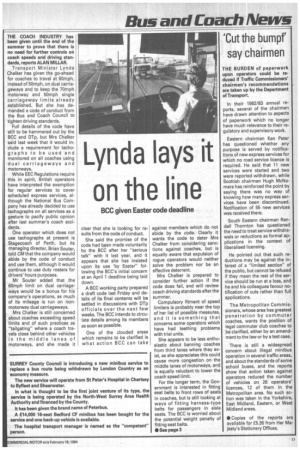Lynda lays it on the line
Page 19

If you've noticed an error in this article please click here to report it so we can fix it.
BCC given Easter code deadline
THE COACH INDUSTRY has been given until the end of the summer to prove that there is no need for further controls on coach speeds and driving standards, reports ALAN MILLAR.
Transport Minister Lynda Chalker has given the go-ahead for coaches to travel at 60mph, instead of 50mph, on dual carriageways and to keep the 70mph motorway and 50mph single carriageway limits already established. But she has demanded a code of conduct from the Bus and Coach Council to tighten driving standards.
Full details of the code have still to be hammered out by the BCC and DTp, but Mrs Chalker said last week that it would include a requirement for tachographs to be used and monitored on all coaches using dual carriageways and motorways.
While EEC Regulations require this in spirit, British operators have interpreted the exemption for regular services to cover scheduled express services, although the National Bus Company has already decided to use tachographs on all services as a gesture to pacify public opnion after last summer's coach accidents.
One operator which does not use tachographs at present is Stagecoach of Perth, but its managing director, Brian Souter, told CM that the company would abide by the code of conduct and use them, although it would continue to use duty rosters for drivers' hours purposes.
Mr Souter added that the 60mph limit on dual carriageways would be a bonus for his company's operations, as much of its mileage is run on nonmotorway dual carriageways.
Mrs Chalker is still concerned about coaches exceeding speed limits and of such practices as "tailgating" where a coach travels close behind other vehicles in the middle lanes of motorways, and she made it clear that she is looking for results from the code of conduct.
She said the promise of the code had been made voluntarily by the BCC after her "serious talk" with it last year, and it appears that she has insisted upon its use 'by Easter" following the BCC's initial concern at an April 1 deadline being laid down.
A BCC working party prepared a draft code last Friday and details of its final contents will be settled in discussions with DTp officials over the next few weeks. The BCC intends to circulate details among its members as soon as possible.
One of the clouded areas which remains to be clarified is what action BCC can take against members which do not abide by the code. Clearly it wants the code to deter Mrs Chalker from considering sanctions against coaches, but is equally aware that expulsion of rogue operators would neither solve the problem nor be an effective deterrent.
Mrs Chalker is prepared to consider further action if the code does fail, and will review coach driving standards after the summer.
Compulsory fitment of speed limiters is probably near the top of her list of possible measures, and it is something that concerns some operators which have had teething problems with trial units.
She appears to be less enthusiastic about banning coaches from third lanes where they exist, as she appreciates this could cause more congestion on the middle lanes of motorways, and is equally reluctant to lower the coach speed limit.
For the longer term, the Government is interested in fitting seat belts to front rows of seats in coaches, but is still looking at ways of fitting harness-type belts for passengers in aisle seats. The BCC is worried about the potential weight penalty of fitting seat belts.
• See page 3




















































































